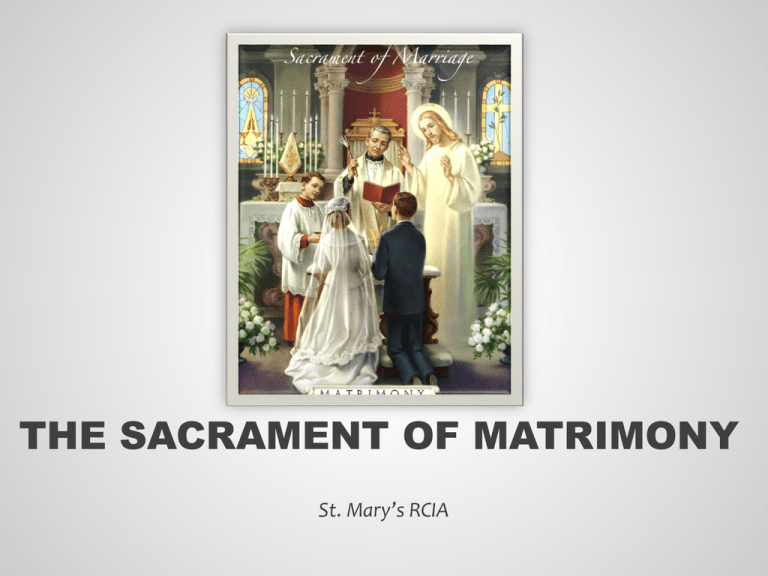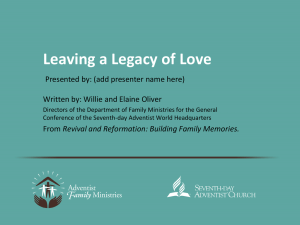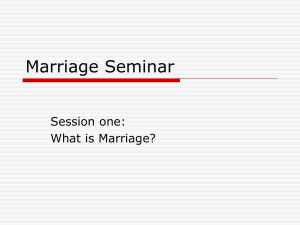
THE SACRAMENT OF MATRIMONY
St. Mary’s RCIA
What is the plan of God regarding man
and woman?
Matthew 19:6 and Genesis 1:28
Compendium
Catechism of the
Catholic Church
Page 95
For what ends has God instituted Matrimony?
“The marital union of man and woman, which is founded
with its own proper laws by the Creator, is by its very
nature ordered to the communion and good of the couple
and to the generation and education of the children.”
“According to the original divine plan this conjugal union
is indissoluble, as Jesus Christ affirmed.” Mark 10:9
Compendium Catechism of the Catholic Church Page 96
How does sin threaten marriage?
“Because of original sin, which caused a rupture in the
God-given communion between man and woman, the
union of marriage is often threatened by discord and
infidelity.”
“However, God in his infinite mercy gives to man and
woman the grace to bring the union of their lives into
accord with the original divine plan.”
Compendium Catechism of the Catholic Church Page 96
What new element did Christ give Matrimony?
“Christ not only restored the original order of matrimony
but raised it to the dignity of a sacrament, giving spouses
a special grace to live out their marriage as a symbol of
Christ’s love for his bride the Church.”
Ephesians 5:25
Compendium Catechism of the Catholic Church Page 96
John 2:1-11:
How much wine?
Each stone jars, can approximately contain 20 gallons of water. So, its about
120 gallons of water (~450 liters).
The Catholic Church distinguishes between legal marriage and
the Sacrament of Matrimony
Being married civilly doesn’t necessarily mean that the two
people participated in the sacrament of Matrimony.
A Catholic marriage involves two baptized people, one or both of
whom are Catholic.
The union of a couple in a Catholic marriage is not the
just the occasion for a good party.
Catholic marriage is a vocation, a calling from God, from
the Latin vocare meaning to call.
Just as priests, deacons, religious sisters and brother,
nuns and monks have a calling from God, so do married
people, as well as unmarried people.
Being a good husband or wife –then a good father
or mother –is as much a sacred calling from God as
the call to enter a convent and become a Poor
Clare, Dominican, or Carmelite nun.
Married people are to be sanctified as much as
clergy and religious brothers and sisters.
Because marriage is a vocation
and a sacrament, marriage
imparts a special grace that
gives the recipients the
strength and ability to assume
and fulfill all the duties and
responsibilities of Christian
marriage.
The participants must enter the
Sacrament of Matrimony with
the intention that their union
will be:
Permanent: Unto death
Faithful: No adultery
Fruitful: Open to the possibility
of children if God wills it.
The Sacrament of Matrimony must give to the bride and groom
the necessary graces to bring those vows to fruition.
How to get married in the Catholic Church?
At least one person must be Catholic,
but the other person can be any
religion.
If the non-Catholic was baptized in a
non-Catholic Church, documentation
to verify the Baptism must be
provided.
If the non-Catholic is unbaptized,
unchurched, or of a non-Christian
religion, special dispensation from
the local bishop is needed. The priest
or deacon doing the ceremony can
obtain it.
A Valid Sacrament of Matrimony
• Requires a priest or deacon
• A bride and groom (no same sex marriages)
• Two witnesses (any religion)
Wedding banquets and
receptions
Are not
required!
The
celebration
and
expense is
up to the
bride and
groom $$$
Just before the formal vows, the priest or deacon asks
the couple three important questions:
1. Have you come here freely and
without reservation to give
yourselves to each other in
marriage?
2. Will you love and honor each other
as husband and wife for the rest of
your lives?
3. Will you accept children lovingly
from God and bring them up
according to the law of Christ and
the Church?
Marriage Vows
I, Renae,
take you
Shane, to be
my husband.
I promise to
be true to
you in good
times and
bad, in
sickness and
in health. I
will love and
honor you
all the days
of my life
I, Shane, take
you Renae, to
be my
husband. I
promise to be
true to you in
good times
and bad, in
sickness and in
health. I will
love and honor
you all the days
of my life
After the vows, the rings are blessed.
The groom places one ring on the bride’s finger and says:
“Take this ring as a sign of my love and my fidelity, in
the name of the Father and the Son and the Holy Spirit.”
The bride takes the other ring and places it on the groom’s finger and says the same
words.
Annulment
Like Baptism, Confirmation and Holy Orders, Matrimony only takes
place once between the same two people.
Catholics can only marry someone who is
widowed or wasn’t married before.
If a person is previously married and the
spouse is alive, it must be demonstrated
that the marriage was invalid, so the
previous union can be declared null and
void through annulment.
Then the person is free to marry someone
else.
How can this be demonstrated?
If one or both spouses didn’t intend to
enter a permanent, faithful, and/or fruitful
union, that deficiency renders the
marriage invalid.
Annulment
Church annulments are not a form of divorce and have no affect
whatsoever on the legitimacy of children because that’s a purely
legal matter.
Annulments don’t make children born of that union illegitimate.
Annulments declare that a marriage was never a valid sacrament in
the first place even if both parties entered into it with good faith
intentions.
Annulment
How much does an annulment cost?
Fees associated with the annulment process vary within the U.S.
Most tribunals charge between $200-$1000 for a standard nullity
case.
Fees are typically payable over time, and may be reduced or
eliminated in cases of financial difficulty.
Other expenses may incurred when consultation with medical,
psychological, or other experts is needed.
How long does it take to get an annulment?
It usually takes 12 to 18 months.
Convalidation
A convalidation ceremony is needed
when a Catholic couple gets married
in a civil or non-Catholic ceremony, which
makes it an invalid marriage in the eyes of
the Church.
Even if only one of them is Catholic, it’s and invalid sacrament, because Catholics
must always follow Church law.
If two baptized but non-Catholic Christians get married, however, in a civil
ceremony or any religious denomination, the Catholic Church does recognize that
as being a valid marriage as long as it is the first marriage for both of them.
If a couple marries in haste but later realizes that, yes, they will remain together,
the couple can have the union recognized by God and the Church through
convalidation.
Cohabitation
The Church teaching on cohabitation
reflects its belief about the dignity of
marriage. “Marital love is an image of
God’s love for humanity” (CCC#1604) and
“Christian marriage is a sign of Christ’s
union with the Church” (CCC #1617).
“This union can never be temporary or a
‘trial’.” (USCCB, Why Isn’t It Good to Live
Together Before Marriage?)
Among young people, there is a belief that cohabitation is a good
preparation for marriage, like a trial run. There is no available data to
support this conviction and even indicate that those who cohabit
before marriage may be likely to divorce later.
(USCCB, Six Important Trends in Marriage and Family Life)
Three Important Points
If a Catholic gets married by a Justice of the Peace, a captain on a
ship, a mayor, or a Protestant minister, and hasn’t obtained a
dispensation from the local Catholic bishop, then the marriage is
invalid, and the Catholic is not allowed to receive Holy
Communion until that union is sanctioned by the Church in a
convalidation.
If a Catholic has been previously married and or marries someone
who has been married previously outside of the Church, the
Catholic is not allowed to receive Holy Communion until the they
are free to marry through annulment or lack of form.
If a couple cohabitates (lives together), it is the hope of the
Church that they will marry. The couple cannot receive the
sacraments until they show that they intend to marry (set a date).
They are not allowed to continue receiving the sacraments until
The Sixth and Ninth Commandments: Honor Human Sexuality
The Sixth Commandment is “Thou shalt not commit adultry” and the Ninth is “Though
shalt not covet they neighbor’s wife.”
Both deal with honoring human sexuality.
The Sixth Commandment forbids the actual, physical act of having
immoral sexual activity, specifically adultery, which is sex with
someone else’s spouse or a spouse cheating on their partner.
The Sixth Commandment also includes
fornication, which is sex between
unmarried people, prostitution,
pornography, homosexual activity,
masturbation, group sex, rape, incest,
pedophilia, bestiality, and necrophilia.
X
X
The Sixth and Ninth Commandments: Honor Human Sexuality
The Ninth Commandment forbids the intentional desire and longing
for immoral sexuality.
To sin in the heart, Jesus says, is to lust after a woman or man in your
heart with the desire and will to have immoral sex with them.
Matt 5:27-28
Committing the act of sex outside of marriage is sinful and wanting to
do it is immoral as well, just as to hate your neighbor is like killing him
in your heart.
Just a human life is a gift from God and needs to be respected,
defended and protected, so, too is human sexuality . Catholicism
regards sexuality as a divine gift, so it’s considered sacred in the
proper context of marriage.
The Sixth and Ninth Commandments: Honor Human Sexuality
The Ninth Commandment forbids the intentional desire and longing
for immoral sexuality.
To sin in the heart, Jesus says, is to lust after a woman or man in your
heart with the desire and will to have immoral sex with them.
Committing the act of sex outside of marriage is sinful and wanting to
do it is immoral as well, just as to hate your neighbor is like killing him
in your heart.
Just a human life is a gift from God and needs to be respected,
defended and protected, so, too is human sexuality . Catholicism
regards sexuality as a divine gift, so it’s considered sacred in the
proper context of marriage.
RCIA Group Wedding with Father Vaughn
March 31, 2012 The time will be announced!








